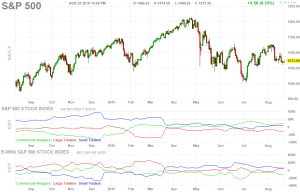It’s Ok to Say “I Don’t Know”
Often on Wall Street and in the media, the worst thing you can do for your career is not have an opinion. When I in training at Citi, they told us “no matter what have an opinion”. This is, of course, because conviction sells.
This need to have a view is best displayed in the Economic and Macro arena, where economists and analysts come together for something resembling the combination of a circle jerk and a pissing match. Currently there is a big inflation/deflation debate reverberating through the markets and media. This is an important debate and the side of the debate you are on will dramatically affect the composition of your portfolio. But what if you’re just not sure?
It’s ok to not be sure. I have no idea where we are headed and I don’t think I’m alone. Even the pros these days trading global macro strategies are having a hard time. Never (in my somewhat limited experience) have a seen such a bipolar market.
This can be visualized in the chart of the $ES_F.
The flash crash as well as the volatile range through the flash crash candle since May seems to indicate market participants who are both unsure and fearful of being wrong.
So what do you do when you don’t know?
Don’t Invest
One option is to get out of the market when you’re unsure. Joe Fahmy (@jfahmy) has no problem doing this. He often says if a market is not healthy, he doesn’t want to be in it.
This can have high portfolio turnover but portfolio benefits (and health benefits) can offset those costs. If you are actively investing in a market that you’re unsure of you’re more susceptible to mistakes and cognitive biases. Not to mention stress eats you alive.
Invest in Both
One investment strategy that Taleb mentions in The Black Swan is to investing most of your money in T-bills and then putting a small percentage to take advantage of highly improbable events with asymmetric returns. If you believe we’re going to move big, whether there be inflation or deflation you can bet on both. If you structure a portfolio such that the return on one will outweigh the loss on the other, you can literally invest in your “I don’t know” thesis.
Perhaps the much-talked about strength in bonds is a sign that people are doing this, whether investors are aware of their uncertainty or not.
For some ideas on how to play both sides see these posts on Inflation and Deflation by @marketfolly as well as this one over at Pragmatic Capitalist.
Play From the Bottom Up
If you’re having trouble investing from a top-down perspective, perhaps you may want to look from the bottom-up. Tadas Viskanta over at Abnormal Returns has been talking about the forthcoming Golden Age of Stock-Picking. Even in an uncertain economic world, there will always be secular trends to emerge and invest in. The recent strength in names such as $AMZN, $NFLX, and $GMCR shows that secular growth is trading at a premium.
Peter Lynch is famous for remarking, “Invest in what you know.” Even if what you know is that you don’t know, there are still ways to invest.






Leave a Comment